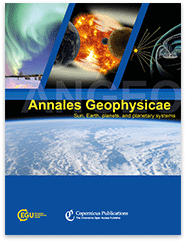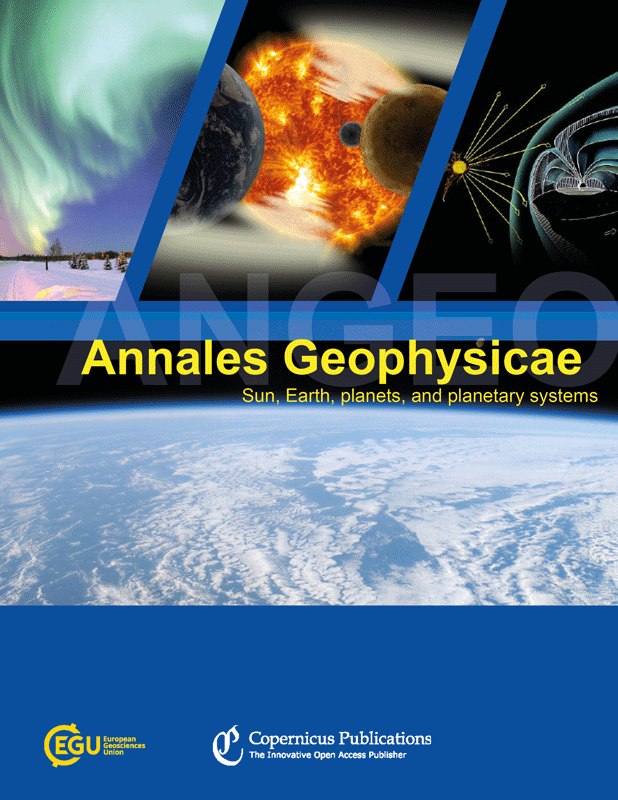Editors-in-chief: Ioannis A. Daglis, Christoph Jacobi & Ingrid Mann
eISSN: ANGEO 1432-0576, ANGEOD 2568-6402
Annales Geophysicae (ANGEO) is a not-for-profit international multi- and inter-disciplinary scientific open-access journal in the field of solar–terrestrial and planetary sciences. ANGEO publishes original articles and short communications (letters) on research of the Sun–Earth system, including the science of space weather, solar–terrestrial plasma physics, the Earth's ionosphere and atmosphere, the magnetosphere, and the study of planets and planetary systems, the interaction between the different spheres of a planet, and the interaction across the planetary system. Topics range from space weathering, planetary magnetic field, and planetary interior and surface dynamics to the formation and evolution of planetary systems.
Journal metrics
ANGEO is indexed in the Web of Science, Scopus, Google Scholar, etc. We refrain from displaying the journal metrics prominently on the landing page since citation metrics used in isolation do not describe importance, impact, or quality of a journal. However, these metrics can be found on the journal metrics page.
News
20 Feb 2025
Get involved, become a referee, and help shape ANGEO's community publication output
We are pleased to announce that a new referee application form is now available. This means that if you are interested in contributing to the peer-review process and supporting high-quality scientific publishing in your community then you can apply today to become a referee. Your expertise can make a difference. Visit the online form here to learn more and join our reviewer community. 
20 Feb 2025
Get involved, become a referee, and help shape ANGEO's community publication output
We are pleased to announce that a new referee application form is now available. This means that if you are interested in contributing to the peer-review process and supporting high-quality scientific publishing in your community then you can apply today to become a referee. Your expertise can make a difference. Visit the online form here to learn more and join our reviewer community. 
10 Feb 2025
Thank you to all our referees in 2024!
A big thank you to all referees for their volunteer work in providing fair, thorough, and constructive peer-review reports! Through their invaluable contribution our interactive open-access journals maintain their high scientific standards and their ongoing success. 
10 Feb 2025
Thank you to all our referees in 2024!
A big thank you to all referees for their volunteer work in providing fair, thorough, and constructive peer-review reports! Through their invaluable contribution our interactive open-access journals maintain their high scientific standards and their ongoing success. 
05 Feb 2025
Copernicus Publications and all journals left Twitter
The Copernicus Twitter account as well as all Twitter accounts of journals published by us have been deactivated. There will be no automatic feeds of newly posted preprints or published journal articles anymore, we do not actively tweet, and the status informs that the accounts are no longer maintained. Twitter is no longer linked from the journal websites or in the share section of the preprint or journal article HTML pages.
05 Feb 2025
Copernicus Publications and all journals left Twitter
The Copernicus Twitter account as well as all Twitter accounts of journals published by us have been deactivated. There will be no automatic feeds of newly posted preprints or published journal articles anymore, we do not actively tweet, and the status informs that the accounts are no longer maintained. Twitter is no longer linked from the journal websites or in the share section of the preprint or journal article HTML pages.
21 Feb 2025
Investigation of the occurrence of significant deviations in the magnetopause location: solar-wind and foreshock effects
Niklas Grimmich, Adrian Pöppelwerth, Martin Owain Archer, David Gary Sibeck, Ferdinand Plaschke, Wenli Mo, Vicki Toy-Edens, Drew Lawson Turner, Hyangpyo Kim, and Rumi Nakamura
Ann. Geophys., 43, 151–173, https://doi.org/10.5194/angeo-43-151-2025,https://doi.org/10.5194/angeo-43-151-2025, 2025
Short summary
31 Jan 2025
Ion beam instability model for the Mercury upstream waves
Yasuhito Narita, Daniel Schmid, and Uwe Motschmann
EGUsphere, https://doi.org/10.5194/egusphere-2025-60,https://doi.org/10.5194/egusphere-2025-60, 2025
Preprint under review for ANGEO (discussion: open, 0 comments)
Short summary
Highlight articles
24 Sep 2024
Calibrating estimates of ionospheric long-term change
Christopher John Scott, Matthew N. Wild, Luke Anthony Barnard, Bingkun Yu, Tatsuhiro Yokoyama, Michael Lockwood, Cathryn Mitchel, John Coxon, and Andrew Kavanagh
Ann. Geophys., 42, 395–418, https://doi.org/10.5194/angeo-42-395-2024,https://doi.org/10.5194/angeo-42-395-2024, 2024
Short summary
04 Jun 2024
Does high-latitude ionospheric electrodynamics exhibit hemispheric mirror symmetry?
Spencer Mark Hatch, Heikki Vanhamäki, Karl Magnus Laundal, Jone Peter Reistad, Johnathan K. Burchill, Levan Lomidze, David J. Knudsen, Michael Madelaire, and Habtamu Tesfaw
Ann. Geophys., 42, 229–253, https://doi.org/10.5194/angeo-42-229-2024,https://doi.org/10.5194/angeo-42-229-2024, 2024
Short summary
More highlight articles  All EGU highlight articles
All EGU highlight articles 
Notice on the current situation in Ukraine
To show our support for Ukraine, all fees for papers from authors (first or corresponding authors) affiliated to Ukrainian institutions are automatically waived, regardless if these papers are co-authored by scientists affiliated to Russian and/or Belarusian institutions. The only exception will be if the corresponding author or first contact (contractual partner of Copernicus) are from a Russian and/or Belarusian institution, in that case the APCs are not waived.
In accordance with current European restrictions, Copernicus Publications does not step into business relations with and issue APC-invoices (articles processing charges) to Russian and Belarusian institutions. The peer-review process and scientific exchange of our journals including preprint posting is not affected. However, these restrictions require that the first contact (contractual partner of Copernicus) has an affiliation and invoice address outside Russia or Belarus.





